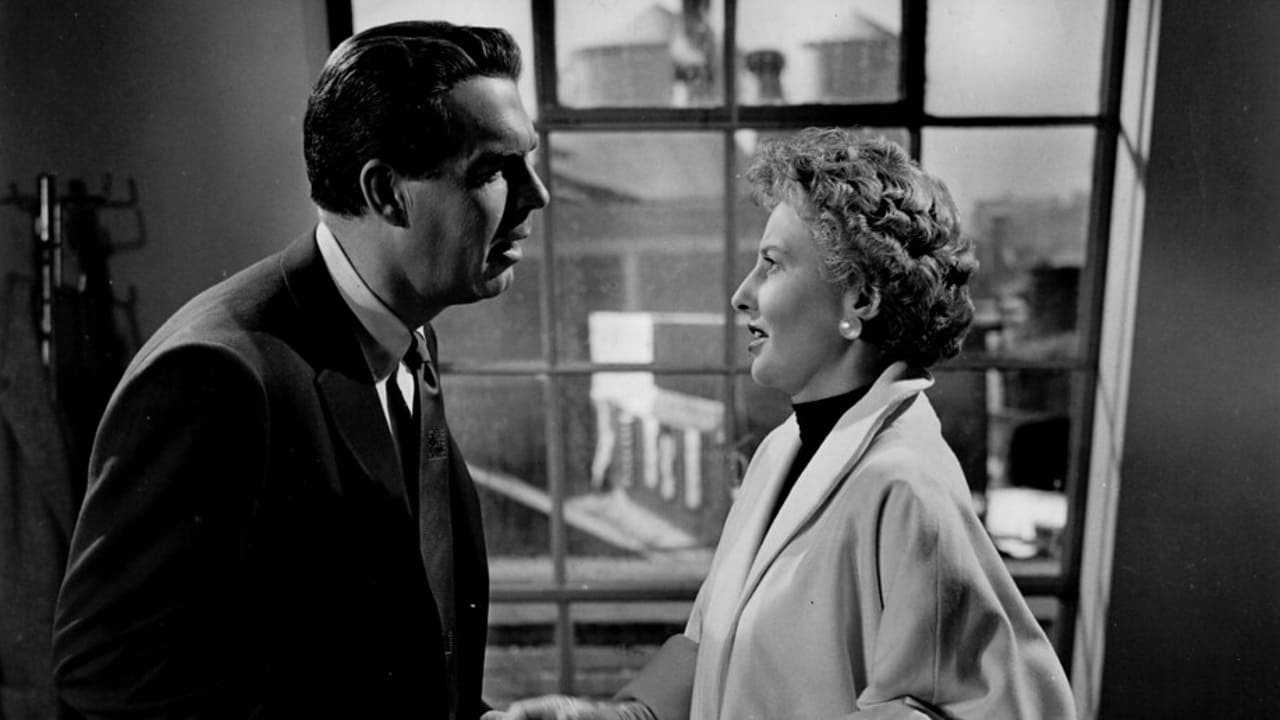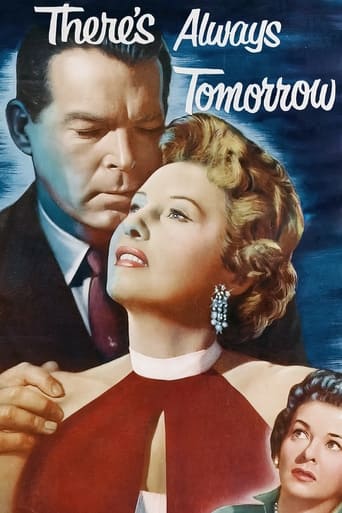

I think this is a new genre that they're all sort of working their way through it and haven't got all the kinks worked out yet but it's a genre that works for me.
... View MoreA film with more than the usual spoiler issues. Talking about it in any detail feels akin to handing you a gift-wrapped present and saying, "I hope you like it -- It's a thriller about a diabolical secret experiment."
... View MoreA film of deceptively outspoken contemporary relevance, this is cinema at its most alert, alarming and alive.
... View MoreAmazing worth wacthing. So good. Biased but well made with many good points.
... View MoreThis version of There's Always Tomorrow plays a tad better than the original version that Universal Pictures did in 1934. For one thing the overwhelming theme of the Great Depression is not present on the screen and the kids are a bit less shallow than those of the originals.Fred MacMurray is a wealthy toy manufacturer who is alienated by his family especially his kids. Wife Joan Bennett takes dependable Fred for granted and the kids, Gigi Perreau, Judy Nugent, and William Reynolds just see him as a cash cow. When an old flame played by Barbara Stanwyck comes to town the results are inevitable. This is the fourth of four films that Fred MacMurray did with Barbara Stanwyck and while fans of both should be pleased it's hardly in the same league as Double Indemnity. Douglas Sirk who did so well by Rock Hudson in the Fifties directed this version of There's Always Tomorrow. It has the requisite number of suds for the glorified soap opera that it is.
... View MoreFred MacMurray and Barbara Stanwyck reunite after "Double Indemnity" and "Remember the Night" to star in this great unknown film, which is another Ross Hunter-produced and Douglas Sirk-directed picture.Joan Bennett is Fred's wife and mother of his three children. But he is missing something, because her children are her world and they are in their own world, always taking. So when old friend Babs shows up, he spends time with her, only to fall in too deep. Unbeknownst to them, his oldest son joins him on a business trip. But, his client cancelled, leaving only Babs there to entertain Fred (who, yes, just happens to be there). The son sees them together laughing and jumps to conclusions. He promptly leaves not telling his father what he's seen. But, nothing ever happened! But the son, played by an actor I don't know, goes ballistic.The only problem I have is that the actor seems to get a little over-the-top. But, then again it is his strong reaction which is the catapult of all that happens later in the film.What makes this exceptional is a well-written and intelligent script and Fred and Babs' credible acting and chemistry. Man, that Stanwyck could act! She could act the arms off a chair! The scene where she chews the children out and the scene where she tells Fred that they could never be, are highlights. This film makes me want to watch nothing but Stanwyck's movies for a month!The title is a little misleading, though. It's obvious they mean that in "another time, another place" it could have happened and he and Babs could have been together. But with Fred a family man, the viewer is expecting him not only to stay with his family, but to really want to and not feel miserable doing for them.That notwithstanding, if you've never heard of this movie, you need to find it immediately. But, you won't regret it. We always have Stanwyck.
... View MoreComing,in Sirk's career ,just after "All that Heaven allows" ,it looks like its twin movie.Unlike "Written on the wind" or "Imitation of life" or "Magnificent obsession" ,it's not melodrama.It's closer to realistic psychological drama.More than the lingering charm of a romantic past (Blue Moon/You saw me standing alone/Without a love of my own),Sirk focuses on the selfishness of the children.Remember in "All that Heaven..." how the son and the daughter could not admit that their mother (of the upper class) should fall in love with a gardener and how they bought her a TV set where she only could see the reflection of her loneliness.Here the boy's attitude is not far from that: a spoiled child -as his sisters are- ,only concerned by his studies and his love affair,he does not care if his papa has become a nine-to-five man ,useful only for the dough he brings home,a life no more exciting than that of the toy robot he sells.Barbara Stanwyck 's role recalls the 1953 effort "all I desire" : the return of the woman,be she legitimate or a former flame.But in "there's always tomorrow",one can notice one of the permanent features of melodrama though: the woman who turns her back on love and becomes a successful businesswoman (or star) (see also the end of "written on the wind" "imitation of life" or Stahl's "only yesterday")
... View MoreDouglas Sirk is renowned for injecting his subversive criticism of American society of the fifties in his glossy and glamorous melodramas. What made this palatable to the public, who flocked in droves, was the fact that the families involved were showbiz families ("Imitation of Life"), filthy rich oil magnates ("Written in the Wind") or highly idealized to the point of caricature ("All that Heaven Allows", "Magnificent Obsession"), far from the average movie goers own social milieu. And of course up there on the screen were the glamorous stars, Rock Hudson, Lana Turner, Lauren Bacall, Dorothy Malone, etc. Movie fans will recall the aforementioned movies when the topic of Sirk's movies arises. It is highly unlikely that "There's Always Tomorrow" will get a mention. "There's Always Tomorrow" has barely any gloss or glamour. The social criticism is completely without disguise. The family in question is one that the vast majority of movie goers could very easily identify with. Its stars (Fred MacMurray and a not so young Barbara Stanwyk) are not glamorous. While audiences left the cinema entranced by the glorious melodrama of "Imitation of Life" and "Written on the Wind", they would have left "There's Always Tomorrow" feeling a lot less secure about their own lives, since it's a film that touches on a fair amount of "dangerous" territory, calling into question the very foundations of the American family. Douglas Sirk's sense of irony has never been sharper. The title brims with optimism and the film opens with the script, "Once Upon a Time in Sunny California". But what unfolds is a bleak, pessimistic depiction of middle class family life.While Sirk's films have often been branded "woman's pictures", "There's Always Tomorrow" is indeed very much a man's picture. It takes a hard and deep look at the role of the male breadwinner and the picture it comes up with is not a pretty one. What we are shown is a man who when young, courted the prettiest girl, married, had children and worked hard to build up a successful business. He is now middle aged and having achieved it all, begins to feel himself taken for granted by his wife and children. His needs are completely neglected. His wife has little interest in him sexually being totally wrapped up in fulfilling the unending needs of their self centered ungrateful children. It's a scenario all too familiar to millions of men. Fred MacMurrays's Clifford Groves has become a robot similar to the one his successful toy manufacturer has created. No wonder that Norma Vale's (Stanwyk) reappearance in his life presents an opportunity to regain his lost dreams. She's an independent career woman, who sees his situation as somewhat idyllic from the outside. But with the usual intelligence of a Stanwyk character, she has no illusions as to a possible future with him. Despite the brief and obligatory conciliatory ending, Clifford Groves' future does not bode well. It should come as no surprise that the film was not well received at the box office. "There's Always Tomorrow" has many of the hallmarks of Sirk's craftsmanship. The studio refused to grant him his request for the film to be shot in color, despite having provided Universal with some of its highest grossing pictures of the decade. At least his demand for his favorite cameraman Russell Metty was granted. Metty as always, was the perfect partner in realising Sirk's vision. His interior filming in particular is a lesson in cinematography. He had a penchant for shooting characters behind banisters, framed in mirrors and caged behind fences to enhance the sense of their being trapped. MacMurray and Stanwyk are constantly gliding through dark shadow and bright light reflecting the inherent brightness and darkness in their lives. At this point of writing "There's Always Tomorrow" has not been released in any format and rarely gets a showing on television. It's a gross injustice to an extremely important director and a wonderfully made, moving piece of cinema.
... View More